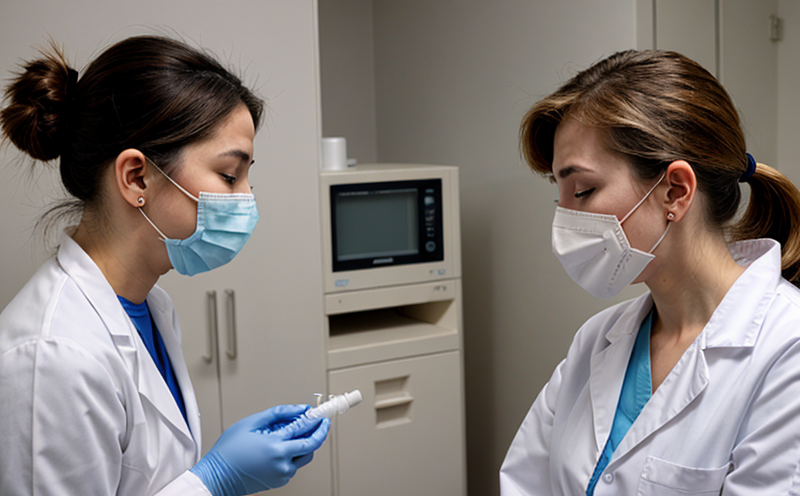Gluten (Wheat) Allergen Testing in Processed Foods
The prevalence of gluten and wheat allergies continues to grow, affecting millions worldwide. Ensuring the safety and compliance of processed foods is critical for manufacturers, especially those targeting consumers with celiac disease or non-celiac gluten sensitivity. Gluten allergen testing plays a pivotal role in safeguarding these products.
Gluten, primarily derived from wheat, barley, and rye, can cause severe allergic reactions ranging from mild discomfort to life-threatening conditions. This service focuses on the rigorous testing of processed foods to ensure they are free from detectable levels of gluten or meet specified safe thresholds as per international standards like ISO 15255-3.
Our team at [Lab Name] specializes in this service, providing comprehensive testing solutions tailored to the unique requirements of processed food manufacturers. From understanding the intricacies of gluten sources to ensuring robust compliance with regulatory guidelines, we offer a seamless and reliable testing process.
The first step involves thorough sample preparation. This includes extracting potential allergens using specialized extraction techniques followed by analysis through immunoassay methods such as ELISA (Enzyme-Linked Immunosorbent Assay). These methods are highly sensitive and specific to gluten proteins, making them ideal for detecting even trace amounts.
Our services extend beyond just testing. We provide detailed reports that not only confirm the absence or presence of allergens but also offer insights into potential contamination risks. This helps manufacturers make informed decisions regarding formulation changes, sourcing strategies, and packaging modifications.
To ensure accuracy and reliability, our laboratory adheres strictly to established protocols and uses state-of-the-art equipment calibrated according to international standards. Our experienced team ensures that every test is conducted with precision and care, providing results that are both accurate and actionable.
| Testing Parameters | Description |
|---|---|
| Sample Type | Processed food products suspected of containing gluten |
| Methodology | ELISA-based immunoassay techniques |
| Limit of Detection | 0.5 ppm or as per customer requirement |
| Turnaround Time | Average 7 working days, expedited available upon request |
In summary, our Gluten (Wheat) Allergen Testing in Processed Foods service is designed to provide peace of mind for manufacturers by ensuring their products meet stringent safety and regulatory standards. By leveraging advanced testing methodologies and adhering strictly to international guidelines, we deliver reliable results that support informed decision-making processes.
Scope and Methodology
The scope of our Gluten (Wheat) Allergen Testing in Processed Foods service encompasses a wide range of processed food products, including but not limited to cereals, baked goods, snacks, and dietary supplements. Our testing process is meticulously designed to meet the stringent requirements set forth by regulatory bodies such as ASTM F2791 and EN ISO 15255-3.
The methodology involves several key steps:
- Sample Collection and Preparation: We start by collecting representative samples of processed food products. Samples are then prepared for analysis using standardized procedures to ensure consistency and accuracy.
- Extraction: Using advanced extraction techniques, we isolate potential allergens from the sample matrix. This step is crucial in ensuring that only gluten proteins are being tested.
- Analytical Testing: The extracted samples undergo rigorous analysis using ELISA-based immunoassay methods. These tests are highly sensitive and specific, capable of detecting even trace amounts of gluten.
- Data Analysis and Reporting: Once the test results are available, our team conducts thorough data analysis to determine compliance with specified thresholds. Detailed reports are then generated, highlighting findings and recommendations for any necessary corrective actions.
The entire process is conducted in a controlled environment using high-precision equipment calibrated according to international standards. This ensures that all tests are accurate, reliable, and repeatable.
Customer Impact and Satisfaction
- Enhanced Consumer Safety: By ensuring processed foods are free from detectable levels of gluten, we help protect consumers with celiac disease or non-celiac gluten sensitivity.
- Promotes Brand Trust: Our services contribute to maintaining the reputation and trustworthiness of your brand among health-conscious consumers.
- Avoids Legal Consequences: Compliance with international standards minimizes the risk of legal actions due to non-compliance or product recalls.
Customer satisfaction is a top priority for us. Our comprehensive approach ensures that every aspect of gluten allergen testing is addressed, providing peace of mind and confidence in your products' safety.
Use Cases and Application Examples
- R&D Innovations: Gluten (Wheat) Allergen Testing assists R&D teams in developing new gluten-free products or reformulating existing ones to meet market demands.
- Purchase Verification: Procurement departments can use our service to verify the authenticity and safety of ingredients sourced from suppliers.
- Compliance Audits: Quality managers and compliance officers rely on this testing during routine audits to ensure ongoing adherence to regulatory requirements.
These real-world applications underscore the importance of rigorous gluten allergen testing in maintaining product integrity and consumer trust.





